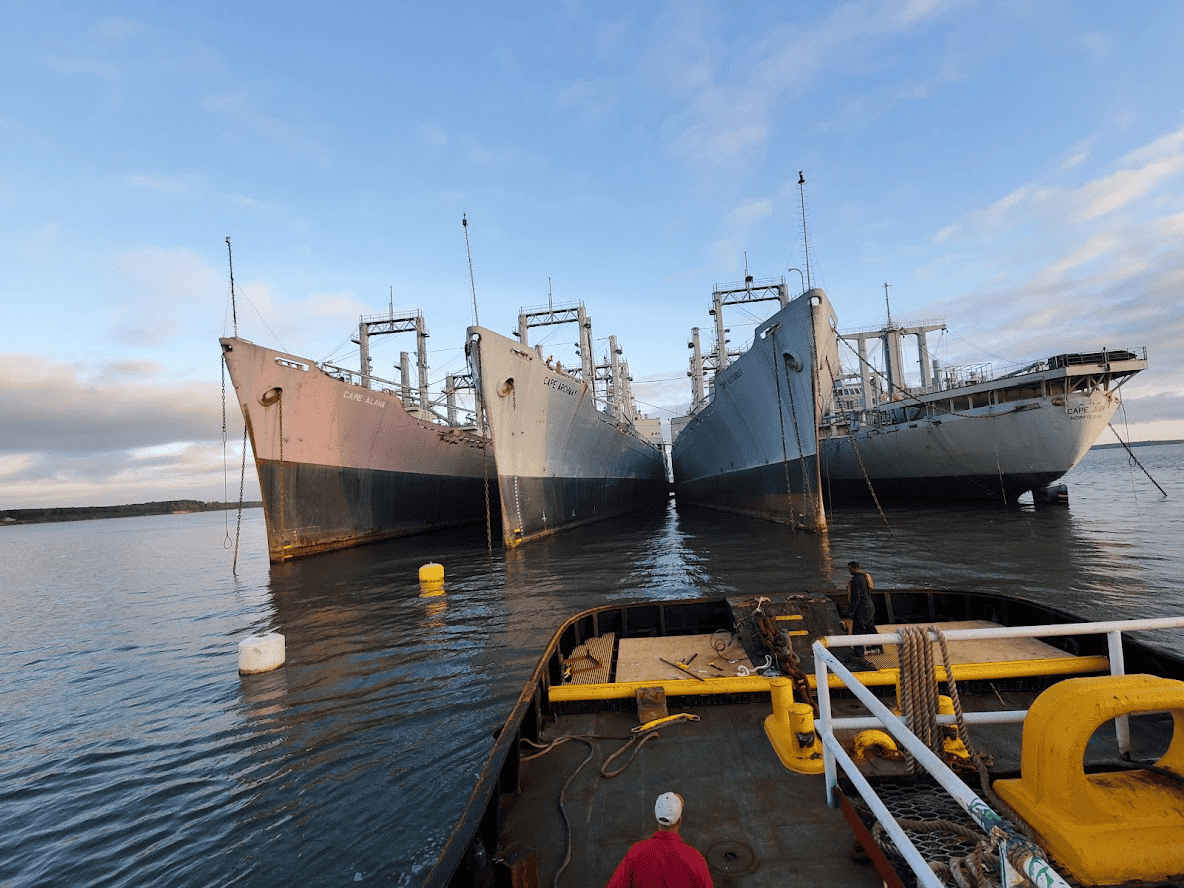Government Cases / Suits in Admiralty Act and Public Vessels Act
Government Ships May Look the Same But Suits Are Very Different
Today many merchant vessels are owned or operated by the United States of America. Often these ships look like private vessels and may be owned by private companies and chartered to the United States. If a seaman or longshoreman is injured on a government vessel the case may be (and probably is) against the United States and not the private company. In these instances, the rules and law for bringing suit are dramatically different than suing a private company.
There are often notice and claim requirements and short statutes of limitations. The procedural requirements, venue rules and rules for proper parties are very different in these actions and if a maritime worker or his lawyers are not familiar with this type of case the matter could be lost before it is even started.
At Clark & Zedella we have litigated a multitude of claims against the United States. These matters are technically complex and the United States has many defenses in addition to the standard defense in a maritime injury case.
If you are a maritime worker, seaman, longshoreman or repairmen who has been injured on a government vessel it is crucial that you contact maritime attorneys immediately to understand your rights and responsibilities when it comes to suing the government.
Government Vessels
Government vessel means a vessel owned by the U.S. Government and operated directly by the Government or for the Government by an agent or contractor, including a privately owned U.S. flagged vessel under bareboat charter to the Government.

Sovereign Immunity
The concept of sovereign immunity prohibits suits against the government, including federal, state and local governments, foreign governments and vessels and cargos owned by them, unless immunity is waived by the governmental entity.
In admiralty tort claims against the United States, the only waivers of sovereign immunity are the Suits in Admiralty Act (“SAA”) and the Public Vessels Act (“PVA”).
Jurisdiction Against the United States
These waivers of immunity under the SAA and PVA do not provide a legal cause of action and are not an independent source of rights; they only constitute a waiver of sovereign immunity and provide subject matter jurisdiction.
The Suits in Admiralty Act (“SAA”) Suits in rem and in personam
Vessels and cargo owned by the United States are immune from arrest in rem, the SAA generally substitutes an in personam action against the United States arising within the admiralty jurisdiction.
The SAA has been described as the maritime analog to the Federal Tort Claims Act (“FTCA”). The SAA applies when (1) a vessel is owned by the United States or operated on its behalf, and (2) there is a remedy cognizable in admiralty for the injury. In 1960 the SAA was amended to provide that the United States may be sued under that statute whenever a proceeding in admiralty could be maintained if a private person or property were involved.
Often the SAA is applicable in cases involving vessels owned or operated by agencies of the United States like the Military Sea-Lift Command and MARAD. Also, the SAA is used in cases involving private vessels operated or chartered by the United States.
Whenever the activities of a United States government agency have the required nexus to traditional maritime activity for admiralty jurisdiction suit is properly brought under the SAA or the PVA.
Courts have held any suit for damages caused by a public vessel, whether for personal injuries or breach of contract damages, falls under the exclusive action provisions of the PVA and SAA.
Clark & Zedella have litigated many of these matters when there is admiralty jurisdiction and there is an action properly brought against the United States. There are many specialized rules and procedures in these cases and if they are not followed a case can be lost. Lawyers inexperienced in maritime cases in general and maritime government cases specifically should not tackle these matters. Only attorneys who are well versed in maritime law and government ship cases are qualified to litigate these complex matters.
SAA Venue
Venue under the SAA is proper where any plaintiff resides or has a principal place of business or where the government vessel or cargo is found at the time the suit is filed.
SAA and PVA
Federal Court / Non-jury
Cases under the SAA and PVA can only be filed against the United States, in Federal Court and are exclusively non-jury. The case will be decided by a Federal Judge sitting alone, subject to appeal.
Statutes of Limitation and Administrative Claims
In general, the United States Code imposes a jurisdictional requirement of a two-year time bar on commencement of suit under the SAA and other acts.
The very real possibility of the jurisdictional prerequisite of an administrative claim may effectively shorten that time limitation. A wise claimant and attorney should be thinking in terms of months not years to investigate, give notice, make claims and file suit.
As some claims in government cases, under certain facts require an administrative claim and notice to the government it is wise for claimants and attorneys to assume this is required and calculate notice, administrative claims and time limitations on this assumption.
Some Courts have held there is no requirement of an administrative claim under the SAA, but this may not be entirely clear in all cases and under all facts and caution considering notice and time deadlines is well advised.
The Clarification Act and Its Requirements for Seaman’s Claims
The Clarification Act requires submission of an administrative claim. No suits can be brought against the United States by seamen employed on government owned vessels unless the claims have been denied (which is deemed to have occurred after 60 days). Thus, a claim under the Clarification Act must effectively be made within 22 months (at a minimum) of occurrence.
The Clarification Act gives to seamen employed by the United States on government owned vessels the same rights against the United States with respect to death, injuries, illness, maintenance and cure, loss of effects, detention or repatriation and collection of wages, bonuses and making allotments. These are the same rights seamen have who are employed on privately owned and operated American vessels against the owners and operators of those vessels.
The Extension of Admiralty Jurisdiction Act
The Extension of Admiralty Jurisdiction Act requires filing of an administrative claim six months before commencement of an action against the United States (which applies to ship caused damage that occurs ashore) and therefore the time for filing a claim is effectively reduced to 18 months from the time of injury.
Public Vessels Act (“PVA”)
The PVA provides a waiver of sovereign immunity in admiralty causes of action against the United States arising out of activities of public vessels and their personnel. This waiver is similar to the SAA in many respects but applies to vessels like U.S. Navy and U.S. Coast Guard vessels.
Suits under the PVA include actions for tort damages, personal injury, and compensation for towage and salvage services provided to public vessels.
PVA Venue
The venue provisions of the PVA are more restrictive than under the SAA, requiring that if the vessel or cargo involved is in territorial waters when suit is commenced, the action must be brought in the district in which the vessel or cargo is found. If the vessel or cargo is not in territorial waters, suit may be brought in the district in which any of the plaintiffs reside or conduct business. If there is no such district, suit may be brought in any district of the United States.
Again, under the PVA notice requirements and time limitations on suit may be short.
The Federal Tort Claims Act / Non-Admiralty Claims
Congress has partially waived sovereign immunity for tort claims under the Federal Tort Claims Act (“FTCA”). The FTCA specifically exempts from its application any claim or suit in admiralty which can be brought against the United States under the SAA or PVA.
The FTCA applies to non-maritime claims, including those which are not maritime because they do not arise upon navigable waters or do not involve traditional maritime activities.
Doubts About Facts and Which Act Applies
Early in a claim, there may be doubts about whether a case is maritime or non-maritime, a public vessel (like Navy or Coast Guard), a government vessel run by Military Sea-Lift Command or MARAD, or a private vessel (that looks like a private vessel) that is operated by the government charter.
Investigating the facts about the kind of vessel and its operators can be risky business and often the United States and its agencies do not cooperate or cooperate slowly on who the owners and operators are. Sometimes those facts are not discovered (through Freedom of Information Act “FOIA” requests) until after suit is filed which makes pleading the proper case under the proper Act a technical and risky business.
Notice and Claims Under All Acts And Pleading Acts in the Alternative
In many claims there are factual doubts and a lack of information as to whether the claim is maritime, who the operating agency is, and open questions as to the kind of vessel and who its owners and operators are. In these cases, it may be wise to comply with the procedural, administrative and suit requirements of all possibly applicable federal acts.
In this situation, notice and administrative claims can be presented to known agencies and companies and if suit is filed all acts can be properly pled in the alternative under the Federal procedural rules in Federal District Court.
Under the FTCA notice and denial of a properly presented administrative claim is a prerequisite to a civil action against the United States. If notice, administrative claim and suit requirements are not followed precisely the matter may be lost and dismissed before its ever started.
Warning: Call Now and Don’t Wait
The above explanation on claims and suits against government vessels is not intended to be and is not legal advice. It is for informational purposes only. As noted above the laws, codes and regulations pertaining to your potential claim will vary depending on the vessel owner, vessel operator, type of charter, the individual agency and contractors involved and the location of the accident. Each claim and case is different and the requirements for notice, administrative claim and suit can and will vary depending upon the unique facts. Time deadlines and statutes of limitation vary from claim to claim and regulations, codes and laws are amended and change or are modified by the courts regularly.
In general, the notice, administrative claims and time deadlines are strict, short, definite and inflexible.
Thus, if you have been injured on a vessel that is (or may be) owned, operated or chartered to the United States or its agencies call Clark & Zedella immediately for an analysis of your legal rights and obligations. Waiting can only increase the chances of your claim being time-barred.


